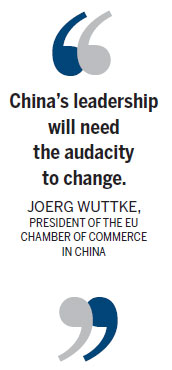'Audacity to change' called best way forward

EU body urges Beijing to stick with economic reform in face of turbulence and growing pains
Companies in the European Union are cautiously optimistic about the business environment in China and hope China will speed up its reform.
The EU Chamber of Commerce in China, which recently published a position paper about business environment in China, welcomed Beijing's statements on reforms that were made during the Third Plenary Session of the 18th Communist Party of China Central Committee at the end of 2013.
| Joerg Wuttke, president of the EU Chamber of Commerce in China. Wei Xiaohao / China Daily |
The paper says statements from Beijing "have never been more encouraging to business", highlighting certain steps taken such as the introduction and subsequent reduction of areas of business not permissible to foreigners on "negative lists" as well a reduced Foreign Investment Industrial Guidance Catalogue.
Progress on the Comprehensive Agreement on Investment, as well as the increase in free trade zones, also bode well for EU-China commercial relations.
Joerg Wuttke, the chamber's president, told reporters at a news conference held to release the paper that European companies are also happy to see the establishment of specialized courts for intellectual property rights as well as the expansion of pension and healthcare insurance coverage, and budgetary and local debt reforms.
According to Wuttke, EU companies from manufacturing industries, such as chemical and automobile, are those that will benefit most from economic reforms in China.
However, the paper also urges the Chinese leadership to make good on market reform promises that can firm up the nation's softening economy while bolstering trust among European and international businesses.
The paper says in last year's paper that while the golden age for business in China is drawing to a close, it may yet be followed by the dawning of a new era that could be equally rewarding for China and for foreign investors. However this year's paper is more pessimistic, saying that the Chinese economy is faced with the onset of a permanent slowdown.
EU companies, especially in service industries such as banking and logistics, believe reform should be speeded up so that they can benefit more from it, says Wuttke.

"China's slowing economic growth triggered a gloomy mood among European countries, which used to have high expectations of enjoying a considerable tailwind from China's new round of reform to boost their own economic development," says Zhang Haibing, an EU expert from the Shanghai Institutes for International Studies.
"But the slowing of Chinese economic growth does not mean a slowing of reform. Different industries have their own cycles for development and reform," says Zhang.
She says for those important but less-developed industries in China, such as banking, "it's better to spend enough time to make sure an efficient risk-control system has been built up", before more opening-up is seen by foreign companies. Otherwise, "the risks are easily spread all over the world."
According to the chamber's "reality check" on the Third Plenum, based on the input of 37 of its sectoral working groups, 66 percent of the groups perceive some progress has been made, but work still remains to be done, while 10 percent perceive the target has basically been reached, or that there is a clear working plan.
However, 24 percent perceive little or no progress has been made, or that the situation has even deteriorated.
"The Chinese leadership's most pressing issue now is how to move ahead with the promised reforms that will right an unbalanced economy and solve the systemic issues that risk derailing its economic transformation. In short, China's leadership will need the audacity to change," says Wuttke.
"At best it leaves a mixed picture, suggesting that part of China's reform agenda includes new restrictions and that the country is even closing off altogether in some areas of its economy. In fact, never before has the European chamber seen such a contradictory government agenda of reform and closing up. I am very concerned that reform momentum has been lost," he says.
"Along the process of reforming, there is a period when new regulations coincide with the old ones, which may trigger the contradictory feeling of the European companies," says Chen Zhimin, an expert on international studies with Shanghai-based Fudan University.
"Two years are still not enough to see significant results of the reform. We need to deal with it in a strategic way in the long run," he adds.
The paper shows that areas requiring China's immediate focus include acceleration of financial system reform, limiting state engagement in the economy, increasing market access for the private sector as well as foreign business, and fully committing to the rule of law.
zhouwa@chinadaily.com.cn
(China Daily European Weekly 09/11/2015 page22)
Today's Top News
- Japan tempting fate if it interferes in the situation of Taiwan Strait
- Stable trade ties benefit China, US
- Experts advocate increasing scope of BRI to include soft power sectors
- New engine powers cargo drone expansion
- China to boost green industry cooperation
- Manufacturing PMI rises in November































